Words of Wisdom - Shastra
& Shastrakaras speak
For Books and shastra downloads see Main Index, under
Books:
Om Namo Bhagavate Vasudevaya
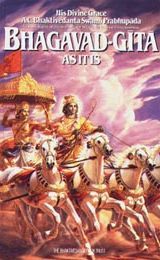

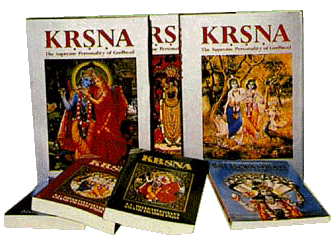
The Complete Works of Srila Prabhupada
All the books, the letters and conversations at your
fingertips
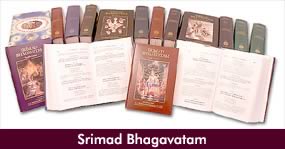

All Srila Prabhupada's books and more on one disk
http://www.vedabase.com




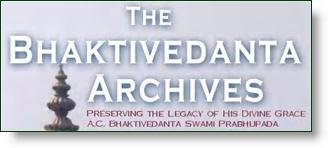
Srila Prabhupada's Audio lectures to listen to on-line:
http://www.hare-krishna.org/srila-prabhupada-lectures.htm
Listen to Srila A.C. Bhaktivedanta Swami Prabhupada on-line
- all 900 of his lectures are available HERE:
http://www.prabhupadavani.org/
Srimad Bhagavatam - the entire lecture series listen and
read along on-line - Narrated by Amala Bhakta dasa:
http://www.prabhupadavani.org/SB_index.html

The new enhanced Prabhupada MP3 series
http://www.prabhupada.com/store/store.php?page=product.php&id=MP3AUDIOLIB








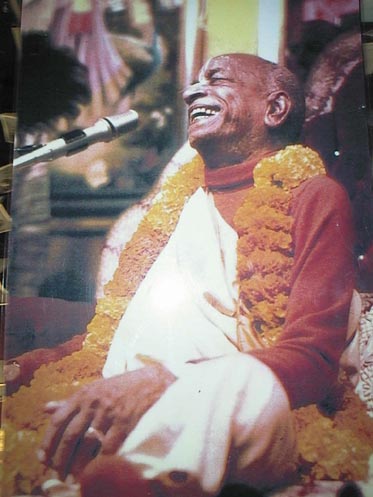
Visit "Prabhupada Connect" for all manner of Prabhupad
Nectar:
http://www.prabhupadaconnect.com/Index.html
Srila Prabhupada's Final Lesson Video - Downloadable and
viewing on-line
http://users.iskconludhiana.com/images/thumbnails.php?album=21


All Srila Prabhupada's original books
available for sale here.

Download all the Hare Krsna teachings which includes
all Vaisnava and
Vedic concepts by visiting one of the sites listed at
the following address.
http://www.geocities.com/suci123/bookdownloadsites1.html
The Bhaktivedanta Book Trust
Srila Prabhupad Memorial Library
http://www.krishna.com/main.php?id=33


33 Books Online Including Srimad Bhagavatam!
http://www.geocities.com/freeprabhupadabooks
The compressed "self extracting" file mentioned is now currently
available for download
http://www.krsnaconsciousness.org/Gauranga/Folio/BhaktivedantaVedabase_DOS.exe

Download or Listen to Prabhupad Bhajans HERE:
http://www.prabhupadavani.org/web/text/Bhajans.html


On-line 1972 McMillan edition - Bhagavad Gita As It Is:
http://www.asitis.com/

Bhagavad Gita AS IT IS on-line through the Tirupathi
Balaji site:
http://www.bhagavad-gita.us/

Bhagavad Gita Study guide on-line book:
http://chantandbehappy.com/gita/studyguide/StudyGuide-main.htm
Bhagavad Gita Study guides by numerous Iskcon devotees
- FREE downloads:
http://www.veda.harekrsna.cz/library/#3

All the Scriptures you'd ever need 4 FREE
http://www.hknet.org.nz/index-books.htm
http://www.hknet.org.nz/DDB.htm
http://www.hknet.org.nz/DDB2.html
last updated 4th August 2003


Srimad Bhagavad Gita AS
IT IS
Bhagavad Gita: Chapter
6 - Dhyana-yoga
TEXTS 11-12
sucau dese pratisthapya
sthiram asanam atmanah
naty-ucchritam nati-nicam
cailajina-kusottaram
tatraikagram manah krtva
yata-cittendriya-kriyah
upavisyasane yunjyad
yogam atma-visuddhaye
WORD FOR WORD
sucau--in a sanctified; dese--land; pratisthapya--placing;
sthiram--firm; asanam--seat; atmanah--his own; na--not; ati--too; ucchritam--high;
na--nor; ati--too; nicam--low; caila-ajina--of soft cloth and deerskin;
kusa--and kusa grass; uttaram--covering; tatra--thereupon; eka-agram--with
one attention; manah--mind; krtva--making; yata-citta--controlling the
mind; indriya--senses; kriyah--and activities; upavisya--sitting; asane--on
the seat; yunjyat--should execute; yogam--yoga practice; atma--the heart;
visuddhaye--for clarifying.
TRANSLATION
To practice yoga, one should go to a secluded place and
should lay kusa grass on the ground and then cover it with a deerskin and
a soft cloth. The seat should be neither too high nor too low and should
be situated in a sacred place. The yogi should then sit on it very firmly
and practice yoga to purify the heart by controlling his mind, senses and
activities and fixing the mind on one point.
PURPORT by HDG Srila A.C. Bhaktivedanta Swami Prabhupad:
"Sacred place" refers to places of pilgrimage. In India
the yogis, the transcendentalists or the devotees, all leave home and reside
in sacred places such as Prayaga, Mathura, Vrndavana, Hrsikesa and Hardwar
and in solitude practice yoga where the sacred rivers like the Yamuna and
the Ganges flow. But often this is not possible, especially for Westerners.
The so-called yoga societies in big cities may be successful in earning
material benefit, but they are not at all suitable for the actual practice
of yoga. One who is not self-controlled and whose mind is not undisturbed
cannot practice meditation. Therefore, in the Brhan-naradiya Purana it
is said that in Kali-yuga (the present yuga, or age), when people in general
are short-lived, slow in spiritual realization and always disturbed by
various anxieties, the best means of spiritual realization is chanting
the holy name of the Lord.
harer nama harer nama
harer namaiva kevalam
kalau nasty eva nasty eva
nasty eva gatir anyatha
"In this age of quarrel and hypocrisy the only means of
deliverance is chanting the holy name of the Lord. There is no other way.
There is no other way. There is no other way."
His Divine Grace A.C. Bhaktivedanta Swami Prabhupada
Copyright 1983 The Bhaktivedanta Book Trust International. Used with
permission.

Bhagavad Gita As It Is - http://www.asitis.com/
Bhaktivedanta Vedabase - Bhagavad Gita on-line http://bhagavadgitaasitis.com/
Bhaktivedanta VedaBase: Bhagavad-gita As It Is http://vedabase.net/bg/en
Bhagavad Gita Multi Media Web-version http://chantandbehappy.com/gita/
Listen to Bhagavad Gita on line - http://www.Gitamrta.org
View our Bhagavad Gita Overview:
http://www.hknet.org.nz/BG.html
Archive: http://www.cs.rice.edu/~vivek/btg/archive/
Home Page: http://www.cs.rice.edu/~vivek/btg/
Join Bhagavad Gita eGroups HERE
mailto:bhagavad_gita-owner@egroups.com


Prabhupada Uvacha:
(here's some nectar, sometimes it comes in the form of Srutakirti prabhu's
diary, other times from Govinda dasi's diary, Hari Sauri prabhu's Transcendental
Diary, Bhurijan prabhu's book, or sometimes from a letter, or other related
source, but still nectar...)
Just like Narendra Mullik
A branch of the Krsna consciousness movement began
spontaneously in Atlantic City, New Jersey, in 1968. One youth had met
the devotees in New York City, chanted with them, gone home to Atlantic
City, and started all his friends chanting. As a result of his spontaneous
attraction to Krsna's name, many devotees joined ISKCON, but he never joined.
Prabhupada asked Brahmananda about that boy, with
whom Brahmananda had been in contact from 26 Second Avenue. When Brahmananda
explained that the boy could not adopt a Krsna conscious lifestyle, Prabhupada
said it reminded him of his own past.
Prabhupada relaxed, leaned back, and gracefully
moved his right arm over the top of his head until his hand touched his
left ear. He explained that because he had seen so many cheating sadhus
as a youth, he had no interest in sadhus as a young man, but his friend,
Narendra Mullik, literally forced him to meet Srila Bhaktisiddhanta Sarasvati
Gosvami Maharaja.
Prabhupada concluded, "Although I did not take
initiation from my Guru Maharaja for six years after this first meeting,
I always thought of him from that first meeting onwards." Then he added,
"Just like Narendra Mullik brought me to my Guru Maharaja but he himself
could not take his shelter, this boy has brought so many others, but he
himself could not join."
Prabhupada's mood as he drew the parallel between
Narendra Mullik and the Atlantic City boy was attractive, sweet, and mysterious.
Hearing him speak made me think about my own case: "Why me and not others?"
Many of my friends had begun chanting but then quickly dropped Krsna consciousness
for other pursuits. Why? Many were more intelligent and seemed more sincere
in their quest for the "truth" than I. Why does one soul stay and another
leave?
The Nectar of Devotion describes that devotional
service is cultivated through many lives. Each soul has his own unique
Krsna conscious history. By the mercy of the Vaisnavas, a soul makes his
Krsna conscious start by hearing the holy name, seeing a holy Vaisnava
book, taking prasadam, or performing service, even unknowingly, to a Vaisnava.
Thus a Vaisnava connects a soul with the Lord's internal energy.
From that point a soul can only move forward.
His Krsna conscious credit is eternal and will increase. One soul may be
hearing about Krsna for the first time whereas someone else, apparently
coming to Krsna consciousness at the same time, may actually be further
along the path.
Compassionate devotees should therefore loudly
chant Krsna's holy names and distribute prasadam and books as widely as
possible, without being attached to the results. Krsna conscious piety
will be bestowed on many, many hearts, and when a soul's time comes, his
fortune will manifest by attraction to serve Sri Sri Radha and Krsna and
Their devotees.
- From the "My Glorious Master" by HG Bhurijana
dasa
To receive little snippets of nectar like this on a daily basis subscribe
HERE: or If you want to introduce anyone else in reading Srila Prabhupada
Nectars, please send their eMail addresses to mailto:krpamaya_gauranga@hotmail.com
Please Chant:
 Hare
Krishna Hare Krishna Krishna Krishna Hare Hare
Hare
Krishna Hare Krishna Krishna Krishna Hare Hare
 Hare
Rama Hare Rama Rama Rama Hare Hare
Hare
Rama Hare Rama Rama Rama Hare Hare
...................and be Happy

Listen to Srila Prabhupad on-line
....a different lecture, morning walk, conversation or
class daily.
"Envious Gross Bodily Religions"
>>> Ref. VedaBase => Bhagavad-gita 4.22 -- Bombay, April 11, 1974
Listen to the entire lecture on-line:
http://news.bbc.co.uk/2/hi/south_asia/6149702.stm
Pradyumna: (leads chanting) Translation: "He who is satisfied
with gain which comes of its own accord, who is free from duality and does
not envy, who is steady both in success and failure, is never entangled,
although performing actions."
Prabhupada:
yadrccha-labha-santusto
dvandvatito vimatsarah
samah siddhav asiddhau ca
krtvapi na nibadhyate
So Krsna is teaching in this Fourth Chapter how to work.
Yadrccha-labha. Don't be greedy, so "This man is millionaire, so I have
to become a millionaire." Competition. That is material disease. Now there
is competition in between the capitalist and the communist. Now the communist
or the laborer class men, they are thinking that "Why the capitalist should
gain? We must gain. The industry is being conducted by us. The profits
shall be divided between us. Why to the capitalist?" So that is not the
solution. That is from frying pan to the fire.
Either the world is run on the principle of communistic
philosophy or capitalistic philosophy, it will never be happy. Here is
the formula, that everyone should be satisfied with the profit that he
can easily make. That's all. Yadrccha-labha. Not that everyone will have
the same profit.
In material world everyone is working. Somebody is getting
per hour thousands of rupees, and somebody is getting not even morsel of
food. But still, one has to be satisfied. "Because one is getting thousands
of rupees per hour, I will have to get also." No. Then you will never be
happy. You be happy what you are gaining. Because everyone is making profit
and losing according to his past karma. Purva-janmarjitam dhanam purva-janmarjitam
vidya, agre dhavati dhavati(?). This is the shastric injunction.
One man is trying with a little capital to do some business,
and within few years he becomes very multi-millionaire. And one man is
trying to elevate himself to a prosperous condition, but he cannot get
even sufficient food. Why? Purva-janmarjitam vidya purva-janma.(?) One
boy is passing examination, standing first-class. Another man, boy, is
failing. Everyone is trying. Everyone should try his best, but he should
be satisfied with the result which comes without any very much strain,
yadrccha-labha. Yadrccha-labha-santustah. That is lacking in the present
civilization. Not only at the present moment, because Krsna was speaking
five thousand years ago. And before that, He spoke Bhagavad-gita millions
and trillions of years ago to the sun-god. This is the way of material
civilization or material conditioned life, competition.
The real competition began by being jealous to Krsna.
Real competition began. Krsna-bahirmukha hana bhoga vancha kare. Krsna
is the Supreme enjoyer. Krsna says, bhoktaram yajna-tapasam sarva-loka-mahesvaram
[Bg. 5.29]. So our fall down this I have explained the other day is there
when we wanted to compete with Krsna or become Krsna. The jealous, iccha....
Iccha-dvesa-samutthena sarge yanti parantapa. Sarge. Sarge means this creation,
this material creation. We have come to this material creation. We do not
belong to this material creation, but we have come here.
Just like one does not belong to the prisonhouse, but
by his own action he comes to the prisonhouse. He becomes criminal, and
therefore he is put into the prisonhouse. By his own activity. It is not
that government wants somebody should live in the prison house and somebody
should live outside prisonhouse, free. It is not government's desire. [break]
...enjoyment we act sinfully also, vikarma. Nunam pramattah. Because we
are mad after sense gratification. But in the human form of life one should
be sensible. Therefore the university education, school, college, institution,
they are meant for human society. There is no such thing in the animal
society. And religion. Religion also meant for human society. Why? Because
this life is not meant for enjoying senses like the animals.
continued.......................
Listen to the entire lecture on-line:
http://news.bbc.co.uk/2/hi/south_asia/6149702.stm
or receive in mailbox and Subscribe HERE:
mailto:lectures-subscribe@prabhupadavani.org
Sravanam kirtanam at:
http://www.PrabhupadaVani.org
© 2001 The Bhaktivedanta Book Trust International. Used with permission.

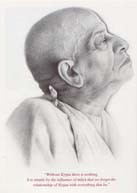
SRILA PRABHUPADA'S QUOTE OF THE DAY
"So far as I am concerned, in relationship with
my disciples who are so kindly cooperating with me in the matter of my
rendering service to my Spiritual Master, for them I am always ready to
come back from Goloka Vrindaban, if they are not delivered along with me.
So don't be worried about the clutches of Maya. Be fixed up in your determination
and go on serving the Supreme Lord, Krishna, with determination."
- Letter to Brahmananda das - November 15, 1969
Sign-up to receive these quote HERE:
mailto:haribol@pacific.net.sg

Bhaktivedanta Vedabase Network ...
http://vedabase.net/


The Scientific - Mathematical
Proof for God's existence:
http://geocities.com/sector114

http://robot-hosting.com/php/login_nicholas.html
user name = guest
password = guest
(Collection of philosophical and mathematical proofs
for existence of God can be found in this site.)

Scientifically Philosophical Books for the layman
 ...
...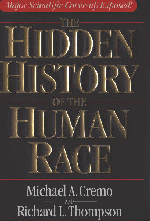 ...
...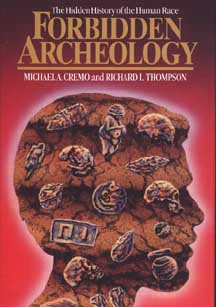 ...
...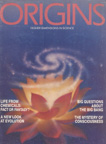
Click on any of these books to read more about them and where to get
a copy
or contact your local temple for purchases
sample of Life
comes from Life HERE.pdf

Lotus Imprints - Preserving Prabhupada's Legacy - The
Publishing House of Hari Sauri dasa
http://www.lotusimprints.com/

Quotes from Shastra - scriptures
View using Balaram font
Xmas Madness
Here we are taking a non-sentimental look at "the festive
season" where in the name of religiosity millions of innocent animals are
slaughtered; where alcoholism and drugs are used by millions in "celebration";
where mindless frivolity, gambling and other time wasting activities are
rife; and where numerous unwanted by-products of loose sexual encounters
take their conception, to burden society, and add to the social bill the
rest of us carry.
Accordingly we must understand what the authorised
scripture calls the modes of nature that such "festivities" come under.
Factually what value these festivals hold to benefit human society in any
way, if any. Also whose "culture" they belong
to... (here we use this word culture in its loosest possible meaning).
Ancient solstice meaning
Christmas, ironically, antedates the Nativity of Christ,
and December 25th is a fudge. In the third century A.D. the Church fathers
chose that day as Christ’s birthday, with good reason. It happens to fall
approximately on the Northern Hemisphere’s Winter Solstice, and December
25th (Midwinter’s Day) which has been from time immemorial a day sacred
to the rebirth of the light of the sun in the depths of winter.
This day was the Festival of Natalis Sol Invictus
(the Birth of the Undefeated Sun) in ancient Rome. Ancient peoples of the
region also commemorated the Babylonian Queen of Heaven, Osiris in Egypt,
Dionysus, Helios, Adonis, the Celtic Cernunnos, the Syrian Baal, Attis,
Mithras, Balder and the Norse goddess Frey - all celebrated on the ancient
Winter Solstice, and mostly solar saviours and dying gods. Most of these
deities were given similar titles: the Light of the World, Sun of Righteousness,
and Saviour. Among these huge celebrations the optimists within the newly
founded Christian Church decided to cash in on the festivities and usurp
them for their own end in swinging their influence toward the celebration
of Jesus the Christ's birth.
As you can testify, it was a great success for them,
so much so that through their zealousness the original events were eclipsed
into near oblivion - who of us learned about them at school, or in our
religious instruction? No they were purposefully hidden, as has so much
been over the past several hundred years by missionaries obviously so inferior
that they had to erase all other cultures world wide to have their new
cult of Christianity stand alone as "the one true way".
By the way did you know that Santa Claus used to wear
green until some advertising materialist decided to change the color scheme
on behalf of Coca Cola in the 1930’s? Commercialism at its "best".............
The original nature of the event that has become known
as XMAS has been further brought out in the following Xmas
pages that reveal how it has degenerated. Get
an in-depth view of the origin of Xmas and it's present form at this other
Xmas page HERE
All the details of Christmas from different cultures around
the world have been compiled by Pip Wilson in his Almanac HERE
 The
Pope begs for forgiveness for sins that the Church has done against other
cultures and religions:
The
Pope begs for forgiveness for sins that the Church has done against other
cultures and religions:
 St
Nick - Santa Claus page
St
Nick - Santa Claus page
Christmas Catching On in India
Source: http://www.hinduism-today.com/1995/11/1995-11-14.html
NEW DELHI, INDIA, December 24, 2002: A recent New York Times article
describes Hindus in India taking to the Christian holiday of Christmas.
While devout Hindus never start their day without lighting at least an
incense stick and offering prayers to their chosen Hindu deity, come December
many begin planning for Christmas. "It doesn't matter if I'm a Hindu. Christmas
stands for love, affection, sharing, renewing family bonds. It's a festival
for everyone," said one of the Hindus interviewed, as she shopped for tree
decorations at New Delhi's upscale Ansal Plaza mall. Not surprisingly are
the many echoes of complaints heard in the West about Christmas becoming
commercialized. The popularity of Christmas does not extend to the religious
themes associated with the festival. It's only Christians who attend midnight
church services on Christmas Eve and nativity scenes can be seen only in
Christian institutions and churches. For a Hindu perspective during this
season of worldwide celebrations, see "source" above for a description
of Pancha Ganapati, a modern festival or "Hindu Christmas," that is a time
of gift giving and home religious observances honoring a family's love
and togetherness, community harmony and cultural celebrations.
This article was by courtesy of http://www.HinduismToday.com/
 Little-Known Stories
Show Christmas Has Some Contentious - and Pagan - Origins - From
the Religion News Service
Little-Known Stories
Show Christmas Has Some Contentious - and Pagan - Origins - From
the Religion News Service
USA, December 24, 2003: This interesting piece on the origins of Christmas
appeared in the Religion News Service and is written by Yvonne Betowt:
Did you know Alabama was the first state to declare Christmas an official
holiday? That happened in 1836, 71 years before the last state -- Oklahoma
-- followed suit in 1907. Christmas is the only legal national religious
holiday in the United States. While it has been less than 100 years since
all 50 states recognized Christmas as an official holiday, Dec. 25 has
been celebrated for centuries by Christians as Jesus' birthday. But until
245 A.D., when a group of scholars tried to determine the date of Christmas,
the question had never been addressed, according to a 1995 article by Victor
M. Parachin in the Christian Reader. However, the project by the early
church theologians was denounced by a church council, which thought it
wrong to celebrate Jesus' birthday "as though he were a King Pharaoh."
That didn't prevent the scholar-theologians from continuing their quest
to determine the day Jesus was born. They originally listed four dates
-- Jan. 1 and 6, March 25 and May 20 -- as possibilities, according to
Parachin's research.
It wasn't until 349 A.D. that Dec. 25 was formally chosen as Christmas
Day by Pope Julius. The date was already celebrated as the Natalis Solis
Invicti in honor of the sun god, Mithras, by Roman citizens. They decorated
their homes with greenery, exchanged gifts and gathered for festive meals
on that date, observed just after the winter solstice. Many scholars believe
Pope Julius picked Dec. 25 as Christmas Day to convert followers of Mithras,
in addition to providing Christians with an opportunity to celebrate Jesus'
birth. Christmas continued, however, to be a contentious issue.
In 17th century England and early America, English Puritans said the
Bible offered no clear basis for celebrating Jesus' birth. In 1643, the
English Parliament outlawed not only Christmas, but Easter and other Christian
celebrations. But by 1660, Christmas had become such a popular holiday,
the law was repealed. After the Pilgrims arrived at Plymouth, Mass., in
1620, their English misgivings about Christmas celebrations continued.
In 1659, people in Massachusetts who celebrated Christmas were fined. The
law was struck down in 1681 because the popularity of observing Christmas
had grown immensely.
However, Christian groups remained divided over whether Christmas should
be celebrated because of its ties to pagan observances. The Lutherans,
Dutch Reformed, Catholic and Anglican churches forged ahead with the celebrations
while the Baptists, Presbyterians, Quakers and Puritans continued to rail
against it. Even today, some Christian groups, including many Churches
of Christ and Seventh-day Adventists, do not acknowledge Christmas as a
religious observance.
Satguru Sivaya Subramuniyaswami created the modern-day festival of Pancha
Ganapati to coincide with the Christmas celebrations for Hindus living
in the West. It's a means to participate in the festive season without
the trappings of another religion's holiday. Click http://www.hinduismtoday.com/archives/1995/11/1995-11-14.shtml
for the details.
This article is by courtesy of http://www.HinduismToday.com/
(24th December 2003)
 Vegetarians
over the Holiday period - looking after them:
Vegetarians
over the Holiday period - looking after them:
 Xmas
Guide for devotees:
Xmas
Guide for devotees:
 Xmas
- a modern page that completely misses the point all about Christmas:
Xmas
- a modern page that completely misses the point all about Christmas:
 Survival
Guide to the Holiday Season:
Survival
Guide to the Holiday Season:
 THE
HOLIDAY FESTIVAL - talk by HH Giriraj Swami
THE
HOLIDAY FESTIVAL - talk by HH Giriraj Swami
 Teen
Vegetarians at Xmas
Teen
Vegetarians at Xmas
 Recipes
4 Xmas
Recipes
4 Xmas
 International
Vegetarian Union's list of Seasonal dishes - some have eggs, garlic
and onion, many are adaptable:
International
Vegetarian Union's list of Seasonal dishes - some have eggs, garlic
and onion, many are adaptable:
 Vegan
Xmas or Yule - some have onion, garlic, mushrooms too:
Vegan
Xmas or Yule - some have onion, garlic, mushrooms too:
 "Culture
- Brahminical or Animal"
"Culture
- Brahminical or Animal"
 Hanukkah
- the Jewish festival of lights over the Xmas period:
Hanukkah
- the Jewish festival of lights over the Xmas period:
 Ramadan
- the Moslem religious observation, explanation page:
Ramadan
- the Moslem religious observation, explanation page:
 Kwanza
- the African-American cultural hereditary observation:
Kwanza
- the African-American cultural hereditary observation:
 Anti-Xmas
page:
Anti-Xmas
page:
 Online
Christmas Games:
Online
Christmas Games:
 PROOF
FROM THE BIBLE-- CHRIST WAS NOT BORN ON DECEMBER 25TH
PROOF
FROM THE BIBLE-- CHRIST WAS NOT BORN ON DECEMBER 25TH
 A
look at the Western Indologists - their motive and intent:
A
look at the Western Indologists - their motive and intent:
 The
Western Scientific Faculty:
The
Western Scientific Faculty:
 Freud
and his psychosis:
Freud
and his psychosis:
 The
myth of slaughterhouse civilization:
The
myth of slaughterhouse civilization:
 History
& Source of Veda:
History
& Source of Veda:
 Vegetarianism
and Beyond:
Vegetarianism
and Beyond:
 Bhaktivedanta
Science Institute:
Bhaktivedanta
Science Institute:
 Darwin
Pages:
Darwin
Pages:
 VedaBase
- A folio of every recorded word written or spoken by the Founder Acarya
of Iskcon:
VedaBase
- A folio of every recorded word written or spoken by the Founder Acarya
of Iskcon:
 Mayapur
Institute of Higher Education:
Mayapur
Institute of Higher Education:
 Vedik
World Heritage
Vedik
World Heritage
 Index
of Vedik links
Index
of Vedik links

The following Sections are from Sri Gaudiya Kantahara
Spiritual Brahmanism
14.93
ya etad akñaraà gärgi
viditväsmäl-lokät praiti sa brähmaëaù
O Gàrgi, one who is
acquainted with that infallible truth by which one transcends death is
a brähmaëa. (Bëhad-Äraëyaka 3.9.10)
14.94
tam eva dhéro vijïäya
prajïäà kurvéta brähmaëaù
A wise person who knows the
Supreme Lord, Parabrahman, through the process of devotion, is a brähmaëa.
(Bëhad-Äraëyaka 4.4.21)
Who is a Brähmaëa?
14.95 and 96
jäta-karmädibhir-yastu
saàkäraiù saàskåtaù çuciù
vedädhyayana-sampannaù
ñaò saö karmasvasthitaù
çaucäcärasthitaù
samyag vighasäçé gurupriyaù
nityabralé satyaparaù
sa vai brähmaëa ucyate
[Bharadväja Muni said,
"O best of the twice-born, Åñi among the brähmaëas,
best of the orators of Vedic knowledge, kindly instruct us in the differences
between brähmaëas, kñatriyas, vaiçyas, and çüdras."
Bhågu Muni replied]:
One whose birth and subsequent
works have all been purified by the appropriate saàskäras,
who has the qualities of purity and cleanliness, who is devoted to Vedic
study, who performs worship of the Supreme Lord, Viñëu, and
who instructs others in that worship, who is a paragon of the six activities
of a brähmaëa, whose behaviour is never impure, who eats the
remnants of his guru's prasàda, who is dear to the guru, who always
carefully follows his vows, and who is fixed in the truth is known as a
brähmaëa. (Bhäradväja Muni)
A Vaiñëava is the Best
of all and the Guru of Everyone
14.97
viñëor ayaà yato
hyäsét tasmäd-vaiñëava ucyate
sarveçäà caiva
varëänäà vaiñëavaù çreñöhaù
ucyate
One who is related to Viñëu
through devotion is known as a Vaiñëava. A genuine Vaiñëava
is superior to all the varëas and is the best of all. (Padma Puräëa,
Uttara Khaëòa 39)
A Vaiñëava from a Caëòala
Family is Worshipable by Brähmaëas
14.98
urdha puëòram måjuà
saumyaà sacihnaà dhärayed yati
sa caëòälo'pi çuddhätmä
püjya eva sadä dvijaiù
A caëòäla
who is a pure Vaiñëava at heart and who decorates the eleven
parts of his body with viñëu-tiläka and sandalwood paste
is always worshipable, even by the best of brähmaëas. (Padma
Puräëa, Uttatra Khaëòa 66.84)
14.99 and 100
sakåt praëämé
kåñëasya mätuù stanyaà pibenna hi
haripäde mano yeñäà
tebhyo nityaà namo namaù
pukkasaù çvapaco väpi
ye cänye mleccha-jätayaù
te'pi vandyä mahäbhägä
haripädaika-sevakäù
One who even once completely
gives up false ego and offers obeisances to the lotus feet of Kåñëa
will never have to take birth again. One who keeps the holy feet of Hari
within his mind is always worthy of worship. Whether one is a pukkasaü,
a dog-eater, or a mleccha, if he takes shelter of the lotus feet of Çré
Hari with pure devotion, and serves Him with attachment, is to be considered
most fortunate and highly worshipable. (Padma Puräëa, Svarga
Khaëòa, 50.10)
Vaiñëavas are Infallible
14.101
sarvaträskhalitädeçaù
sapta-dvépaika-daëòa-dhåk
anyatra brähmaëa-kuläd
anyaträcyuta-gotrataù
Mahäräja Pëthu
was an unrivalled king who had the scepter for ruling all seven islands
on the surface of the globe. No one could disobey his irrevocable orders
except for the saintly persons, the brähmaëas, and the decendants
of the Supreme Personality of Godhead (the Vaiñëavas). (Bhäg.
4.21.12)
The Difference Between a Devotee
who is Low-Born and an Expert Brähmaëa
14.102
na me priyaç caturvedé
mad-bhaktaù çvapacaù priyaù
tasmai deyaà tato grähyaà
sa ca püjy yathä hyayam
A brähmaëa who is
expert in studying all four Vedas is not dear to Me. But a devotee who
comes from a family of caëòälas is dear to Me. He should
be offered gifts and one should accept gifts from him. He is as worhipable
as I am. (Hari-bhakti-viläsa 10.127)
One who Takes the Holy Name of Kåñëa,
has Performed Austerity, Sacrifice, Holy Baths, and Vedic Study, and is
Saved
14.103
aho bata çva-paco 'to garéyän
yaj-jihvägre vartate näma tubhyam
tepus tapas te juhuvuù sasnur
äryä brahmänücur näma gåëanti ye te
O Lord, how glorious are they
whose tongues always chant Your holy name! Even if born in a family of
dog-eaters, such persons are worshipable. Those who chant Your holy name
must have performed all kinds of austerities and sacrifices. They must
have achieved all the good qualities of the Äryans. They must have
bathed at all the holy places, studied the Vedas, and fulfilled all to
chant the Vedas and perform yajïa. (Bhäg. 3.33.7)
The Behavior of Advaita Prabhu Instructs
that a Vaiñëava is the
Guru of the Brähmaëas
14.104
äcärya kahena, "tumi nä
käriha bhaya
sei äcariba, yei çästra-mata
haya
tumi khäile haya koöé-brähmaëa-bhojana"
eta bali, çraddha-pätra
karäila bhojana
[After Advaita Äcärya
offered Haridäsa Öhäkura the çräddha-paöra,
which is usually offered to a worshipable brähmaëa, Haridäsa
Öhäkura was surprised. Reassuring him] Advaita Äcärya
replied, "My dear Haridäsa, do not be afraid, I shall behave strictly
according to the principles of the revealed scriptures. Feeding you is
equal to feeding ten million brähmaëas. Therefore, accept this
çräddha-pätra." Thus Advaita Äcärya made him
eat. (Cc. Antya 3.221-222)
A Vaiñëava is the Guru
for Millions of Brähmaëas
14.105
brähmaëänäà
sahasrebhyaù satrayäjé viçiñyate
satra-yäji sahasrebhyaù
sarva-vedänta-päragaù
sarva-vedänta-vit-koöyä
viñëu-bhakto viçiñyate
vaiñëavänäà
sahasrebhya ekänty eko viçiñyate
Among many thousands of brähmaëas,
a yajïika brähmaëa is best. Amount thousands of yajïika
brähmaëas, one who fully knows Vedänta is best. Among millions
of knowers of Vedänta, one who is a devotee of Viñëu is
best. And among thousands of devotees of Viñëu, one who is
an unalloyed Vaiñëava is best. (Bhakti-sandarbha 177)
Thus ends the Fourteenth Jewel of
the Gauòéya-Kaëöhahära, entitled Varëadharma-tattva
taken from Gaudiya Kantahara Fourteenth Jewel Varnasharamdharma-tattwa

All pictures from Srimad Bhagavatam and Iskcon works - Copyright ©2005
The Bhaktivedanta Book Trust
International, on the web at .http://www.krishna.com/.
Used with permission.









![]()
![]()
![]()

![]()
![]()
![]()
![]()

![]()
![]()
![]()
![]()
















 Little-Known Stories
Show Christmas Has Some Contentious - and Pagan - Origins - From
the Religion News Service
Little-Known Stories
Show Christmas Has Some Contentious - and Pagan - Origins - From
the Religion News Service
